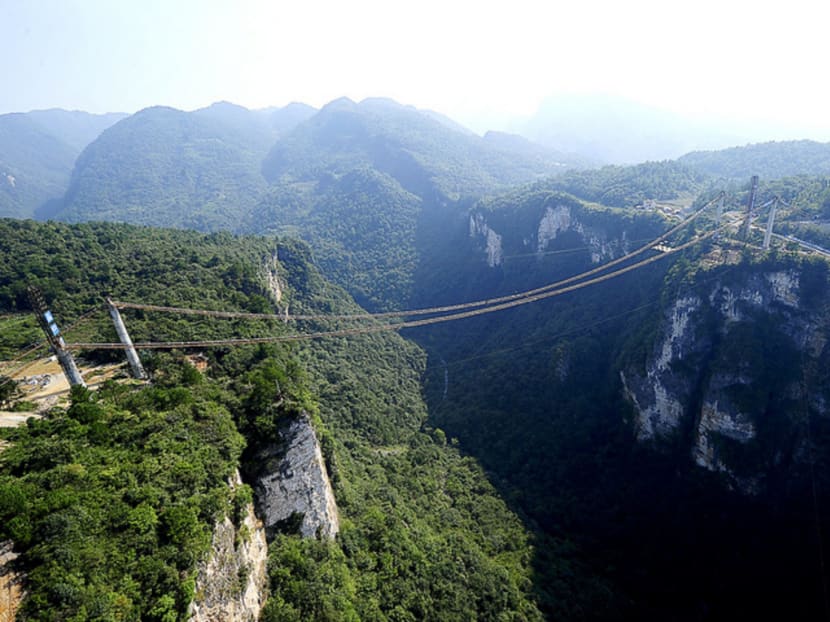Chinese plan to create national park system beset by bickering
BEIJING — A State Council pilot plan to revamp the management of thousands of nature parks and protected land in China — land covering more than one-fifth of the country — is about to kick off, but questions remain over management standards amid infighting between government departments.

A glass bridge under construction over a canyon in Zhangjiajie National Park, Hunan province. A major issue the State Council reform plan is trying to tackle is coming up with a clear definition of what qualifies as a national park. Photo: Reuters
BEIJING — A State Council pilot plan to revamp the management of thousands of nature parks and protected land in China — land covering more than one-fifth of the country — is about to kick off, but questions remain over management standards amid infighting between government departments.
The plan proposes setting up nine national parks in as many major cities and provinces in 2015, and aims to establish a set of national standards on park management that could then be rolled out to more than 8,000 sites across the country over the next two years.
A slew of problems facing the country’s major parks spurred officials to launch the pilot.
“Almost half of China’s nature reserves lack adequate supervision, while 26 per cent have no assigned management team,” Dr Su Yang, a researcher at the Development Research Center, a think tank under the State Council, wrote in a research paper more than a decade ago. “Half of them are polluted as a result of tourism development.”
Getting the parks sorted out will be a mammoth task. China has 1.7 million sq m of land under different levels of government supervision. More than 8,000 parks, nature reserves and other types of protected areas have been established by different government agencies and local governments.
Scholars and environmentalists expect the changes, first mentioned in a Communist Party reform plan in 2013, to lead to management reshuffles in many parks around the country.
However, progress could be difficult due to conflicts among government departments and complicated land issues.
“The main task for the pilot is to figure out what problems and difficulties will emerge when China sets up national parks for nature preservation,” said Dr Yang Rui, the director of Tsinghua University’s department of landscape architecture.
So far the government has not released a detailed plan for how the pilot will be implemented. Sources familiar with the drafting said work has been delayed because government departments continue squabbling.
The disagreements stem from the eagerness of departments to expand their power and interests, said Dr Zhu Chunquan, China’s representative to the International Union for Conservation of Nature, an international organisation that says it is devoted to finding solutions to environmental problems.
The world’s first national park, Yellowstone, in the northern American state of Wyoming, was established in 1872. Since then, countries around the world have developed more than 6,000 similar sites with standardised management and operations to preserve their most beautiful and fragile natural scenery.
But the concept has never been fully adopted in China. A major issue the reform is trying to tackle is coming up with a clear definition of what qualifies as a national park, said Dr Su. According to him, during the past few years, some reserves and tourist spots have been approved by the State Council as national parks, but others were set up by local authorities based on their own standards.
Local officials see such work as a way to make money. Many sites are simply renamed as national parks so they can raise ticket prices, said Tsinghua University’s Dr Yang.
Since 2006, many national parks have been opened in provinces such as Yunnan, Heilongjiang, Sichuan and Shanxi, boosting tourism revenue for local governments.
A park in the north-eastern province of Heilongjiang saw its annual ticket revenue almost triple after it was handed nominal national status, official data shows. On top of all that, protected areas around the country are being threatened by frenzied building and development.
Dr Yang said he hoped that amid all the bickering officials come to see the bigger picture.
“The national park idea will only succeed when people can look beyond departments and personal benefits to consider the broader and long-term interests of everyone,” he said. CAIXIN





